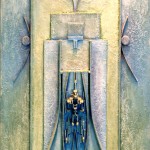Biography
Abraham Palatnik (Born in 1928). Lives and works in Rio de Janeiro. As a child, Brazilian artist Abraham Palatnik moved with his family to Palestine (now the state of Israel) in 1932. From 1942 to 1945, he studied at the Montefiori Technical School, in Tel Aviv, specializing in ignition motors. He began his artistic studies in the studio of the painter Haaron Avni and the sculptor Sternshus, studying aesthetics with Shor. From 1943 to 1947, Palatnik attended the Municipal Institute of Art of Tel Aviv. Returning to Brazil in 1948, he settled in Rio de Janeiro, frequenting the artists Ivan Serpa (1923 – 1973), Renina Katz (1926) and Almir Mavignier (1925). With the latter, he was a frequent visitor to the house of the art critic Mário Pedrosa (1900 – 1981) and became familiar with the work of Dr. Nise da Silveira (1905 – 1999), at the Hospital Psquiátrico do Engenho de Dentro [Psychiatric Hospital of Engenho de Dentro]. Palatnik’s contact with these artists and the conceptual discussions with Mário Pedrosa led him to break with conventional criteria of composition, abandon the brush and the figurative and move towards freer associations between form and color. Around 1949, he began studies in the field of light and movement, which resulted in the Aparelho Cinecromático [Cinechromatic Device], exhibited in 1951, at the 1ª Bienal Internacional de São Paulo [1st São Paulo International Biennial], where he received honors from the international jury. In 1954, he joined the Grupo Frente [Frente Group], along with Ivan Serpa, Ferreira Gullar (1931), Mário Pedrosa, Franz Weissmann (1911 – 2005) and Lygia Clark (1920 – 1988). From 1964 onwards, he developed the Objetos Cinéticos [Kinetic Objects], a progression of his cinechromatic objects, which showed the internal workings and suppressed the projection of light. Mathematical rigour is a constant in his work, acting as an important resource for ordering space. At international level, he is considered to be one of the pioneers of Kinetic Art.

 Untitled
Untitled